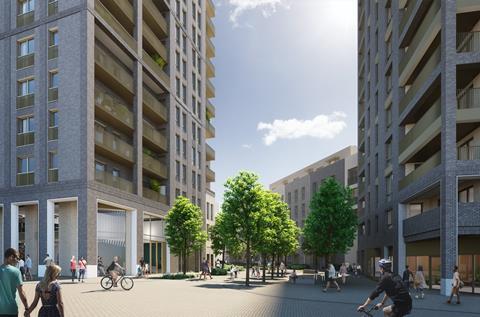London-focused regeneration developer says it has been ‘unaffected’ by build cost rises
London-based regeneration specialist Mount Anvil has reported a sharp rise in profit last year with the firm stating it was “largely unaffected” by construction cost rises and market uncertainty.
In full year accounts filed at Companies House, the company reported a pre-tax profit increase of 59% to £6.3m, on the back of turnover of £245m, up 22%.
It said the increase in turnover was due to large numbers of sale completions at its 796-home Royal Eden Docks scheme, which it is developing in joint venture with the owner of the ExCeL exhibition centre.

Demand for homes, it added in the statement, “remains strong”, despite the recent downturn in the market, while improvements in Mount Anvil’s sales and marketing strategy had resulted “in a record-breaking number of pre-sold homes”, which meant the firm had already secured all of its targeted 2023 sales.
Mount Anvil, which was set up in the 1990s by Irish entrepreneur Killian Hurley, said pre-selling homes did create risk around build cost inflation, but that it managed this “where necessary through optimisation of our schemes”.
The firm, which primarily works with housing associations on estate regeneration projects, built 386 homes through joint ventures in the calendar year, down from 442 in the previous year.
The bulk of Mount Anvil’s revenue for the year – £148m of the £245m – came from contracting work, it said. The firm typically works as builder for the joint venture developments it is a development partner in.
>> See also Briefing: Why Mount Anvil’s ethos comes from ‘granny’s shop’
The firm added: “The Group has continued to be largely unaffected by Brexit or the impacts of the war in Ukraine during the year including labour supply and cost inflation. Our pre-sold sales position remains strong and to date has been largely unaffected.”
The firm made a £5.7m provision in the year to cover “remedial works on legacy schemes”, taking the firm’s total provision in the last two years for scheme repairs to £17.5m. It spent £2.6m in the year on undertaking the repairs itself.
Last October the firm received planning permission for a 1,228-home redevelopment of the Friary Park estate in Acton, west London, in partnership with Catalyst. Earlier this year it broke ground on the 914-home Barnsbury Estate regeneration project in Islington.
In 2021 the business recommitted to only working in London after writing down £4.3m relating to a share of losses on the £250m Kampus build to rent project in Manchester.




























No comments yet